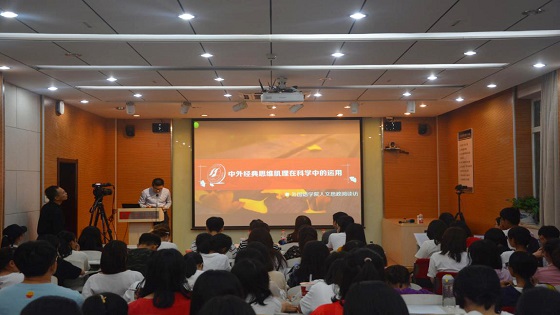The First Lecture of “The Integration of the Arts and the Sciences— ‘Reading Workshop on Humanities

On 6:00 p.m., September 24, the first lecture of “The Integration of Arts and Sciences—‘Reading Workshop on Humanities and Ideology& Politics’ of the SFS” series: The Application of Chinese and Foreign Classical Thinking in Science, was held in Room 304 of the SFS. The lecture was delivered by Prof. Liang Xiaohui of the SFS, USTB. Present at the lecture were Party Secretary Zhang Qiuman, some faculty members of the SFS, and over 150 students majoring in Materials Science and Engineering, Metallurgical Engineering, Mining Engineering, and Foreign Language and Literature. The lecture was presided over by Deputy Party Secretary Wang Yinghui, and the whole process was recorded by Himalaya FM.

Party Secretary Zhang Qiuman first explained how the SFS conducted this lecture series under the inspiration of Prof. Liang, researcher of “How to Improve Students’ Academic Reading and Writing Abilities through Cognitive Linguistics” which is widely praised at home and abroad, and introduced her teaching and research achievements. China is now exploring the concepts of “new disciplines of engineering and liberal arts” and universities are encouraged to generate the spirit of our national ideology and political conferences, and to introduce the ideological and political education into the classroom. Zhang Qiuman said that there is a newly built platform which aspires to integrate the arts and the sciences, ideological and political education and the acquisition of knowledge.
In the lecture, Prof. Liang first introduced the English words “contrast” and “comparison”, and explained “analogical thinking” with vivid examples from Chinese and Western objects, ancient Chinese sayings, Chinese philosophy, gravitational waves and flock effect. Then she presented “comparative thinking” by such examples as the left and right sides of human brain, advertising effect, the comparison of men and women, and the comparison of Chinese and Western education. With ingenious practice design, fast reading and analysis of the main idea of the text, Prof. Liang enabled us to appreciate the mystery of comparative and analogical thinking, to understand how they stimulate innovative thinking, and to analyze the differences between the Chinese Dream and the American Dream through these two ways of thinking, so as to help students build cultural confidence.
Prof. Liang ended by recommending two books—Wang Er’s Stories on Economics and Language and Culture . With a burst of applause, the lecture came to an end. This lecture not only effectively helpedstudents understand and use the “analogical thinking” and “comparative thinking” in terms of study skills, but also stimulated the innovative thinking of students in science and engineering or the liberal arts. At the same time, in an academic context, it brought together the guidance and cultivation of the humanities with ideological and political education including the promotion of a “world outlook, and an outlook on life and values”, and blazed a useful trail for the exploration of how closely to integrate the humanities and education in ideology and politics.
In the future, The Integration of Arts and Sciences—‘Reading Workshop on Humanities and Ideology & Politics’ of the SFS” lecture series will continue to be conducted. It will include three lectures------ How to Improve Learning in the Arts and the Sciences by Fast Reading of Literature and Non-literary texts How to Argue by Integrating the Arts and the Sciences, and How to Achieve the Chinese Dream by Creating Innovative Paths The active participation of teachers and students is welcomed for the exploration and implementation of a talents training model under the integration of humanist education and science education.
